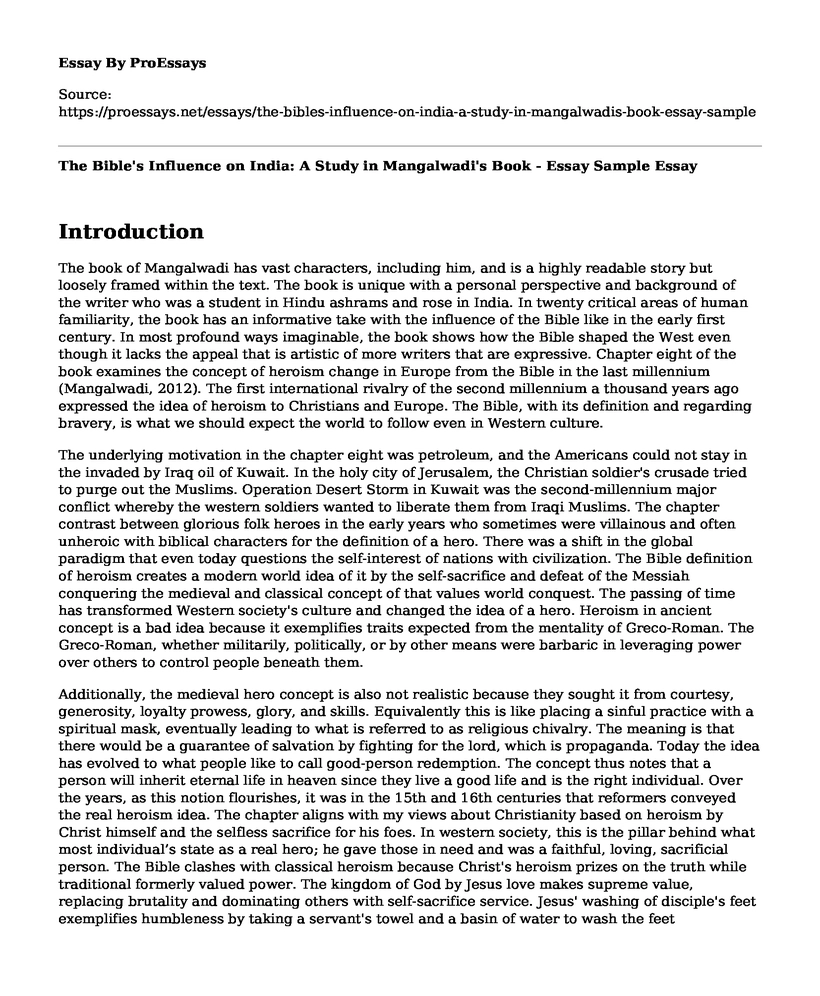Introduction
The book of Mangalwadi has vast characters, including him, and is a highly readable story but loosely framed within the text. The book is unique with a personal perspective and background of the writer who was a student in Hindu ashrams and rose in India. In twenty critical areas of human familiarity, the book has an informative take with the influence of the Bible like in the early first century. In most profound ways imaginable, the book shows how the Bible shaped the West even though it lacks the appeal that is artistic of more writers that are expressive. Chapter eight of the book examines the concept of heroism change in Europe from the Bible in the last millennium (Mangalwadi, 2012). The first international rivalry of the second millennium a thousand years ago expressed the idea of heroism to Christians and Europe. The Bible, with its definition and regarding bravery, is what we should expect the world to follow even in Western culture.
The underlying motivation in the chapter eight was petroleum, and the Americans could not stay in the invaded by Iraq oil of Kuwait. In the holy city of Jerusalem, the Christian soldier's crusade tried to purge out the Muslims. Operation Desert Storm in Kuwait was the second-millennium major conflict whereby the western soldiers wanted to liberate them from Iraqi Muslims. The chapter contrast between glorious folk heroes in the early years who sometimes were villainous and often unheroic with biblical characters for the definition of a hero. There was a shift in the global paradigm that even today questions the self-interest of nations with civilization. The Bible definition of heroism creates a modern world idea of it by the self-sacrifice and defeat of the Messiah conquering the medieval and classical concept of that values world conquest. The passing of time has transformed Western society's culture and changed the idea of a hero. Heroism in ancient concept is a bad idea because it exemplifies traits expected from the mentality of Greco-Roman. The Greco-Roman, whether militarily, politically, or by other means were barbaric in leveraging power over others to control people beneath them.
Additionally, the medieval hero concept is also not realistic because they sought it from courtesy, generosity, loyalty prowess, glory, and skills. Equivalently this is like placing a sinful practice with a spiritual mask, eventually leading to what is referred to as religious chivalry. The meaning is that there would be a guarantee of salvation by fighting for the lord, which is propaganda. Today the idea has evolved to what people like to call good-person redemption. The concept thus notes that a person will inherit eternal life in heaven since they live a good life and is the right individual. Over the years, as this notion flourishes, it was in the 15th and 16th centuries that reformers conveyed the real heroism idea. The chapter aligns with my views about Christianity based on heroism by Christ himself and the selfless sacrifice for his foes. In western society, this is the pillar behind what most individual’s state as a real hero; he gave those in need and was a faithful, loving, sacrificial person. The Bible clashes with classical heroism because Christ's heroism prizes on the truth while traditional formerly valued power. The kingdom of God by Jesus love makes supreme value, replacing brutality and dominating others with self-sacrifice service. Jesus' washing of disciple's feet exemplifies humbleness by taking a servant's towel and a basin of water to wash the feet (Mangalwadi, 2012). God's kingdom is all about this, and the teachings changed the history of heroism to truthiness and sacrifice.
The chapter shows the relationship of world heroism in traditional culture with the Christian view. The work towards the end is explanatory rather than being critical in the development of western culture concerning the Bible. For good and the ill, it is no doubt that the Bible is influential in making the book reliable and an exciting read by its uncritical approach to history. The book bolsters belief if a person solely believes the Bible as the best guide in the responsibility of civilization. The chapter does not value any other religious worldview other than the biblical one, and I agree with it because there is a lack of sustainability in engagement to other alternatives.
Reference
Mangalwadi, V. (2012). The book that made your world: How the Bible created the soul of western civilization. Thomas Nelson.
Cite this page
The Bible's Influence on India: A Study in Mangalwadi's Book - Essay Sample. (2023, Aug 01). Retrieved from https://proessays.net/essays/the-bibles-influence-on-india-a-study-in-mangalwadis-book-essay-sample
If you are the original author of this essay and no longer wish to have it published on the ProEssays website, please click below to request its removal:
- The Central Beliefs, Customs, Traditions Practices and Contributors of Buddhism
- God and Cosmology Essay Example
- Role of Religion in Development of American Character Paper Example
- Essay Example on Theology: Exploring the Nature of God
- Essay Example on Exploring Religion and Spirituality: Reasons to Lead a Spiritual Life
- Combating Islamophobia in Canada: Discrimination, Perspectives and Behaviors - Essay Sample
- Essay Example on Al-Qaeda: Global Terror Network with Extremist Roots







